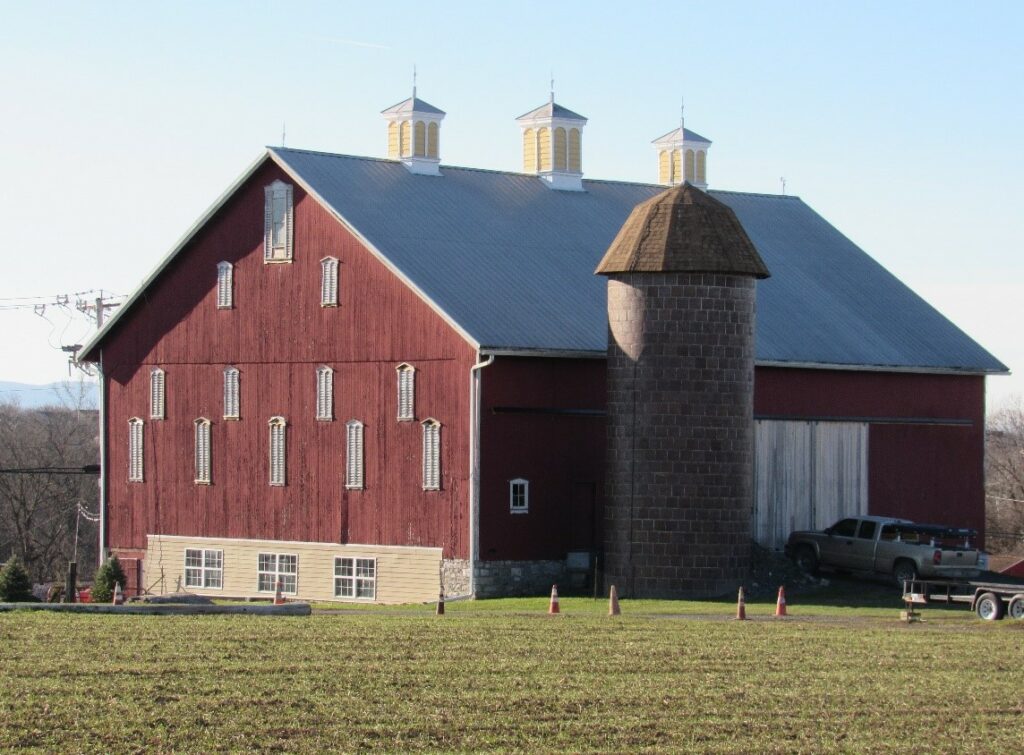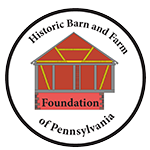June 9 & 10, 2023, Carlisle, Pennsylvania

The 2023 HBFF annual meeting and dinner will be held in Todd Hall of the Cumberland County Historical Society, 21 N. Pitt St., Carlisle. On Friday, June 9th, registration will begin at 11:30 a.m. in Todd Hall. Those registered for the Friday afternoon tour may start boarding the bus at the front of the Historical Society at 12:15 p.m.. The bus will leave promptly at 12:30p.m. The bus will arrive back in front of the Historical Society by 4:00 p.m. The HBFF annual silent auction will run from 4:00 to 6:00 p.m. in Todd Hall, and dinner will also take place in Todd Hall at 5:30 p.m., followed by the annual meeting at 6:30 p.m. A PowerPoint presentation on the Cumberland County Agricultural Reform Movement will begin at 7:00 p.m.
On Saturday, June 10th, six barns in western Cumberland County will be toured. Our buses will pick up attendees at the Holiday Inn & Suites, 1501 Commerce Avenue, Carlisle, for the Saturday tour. The buses will leave promptly at 8:30 a.m. Following the tour of three barns in the morning, a traditional Central Pennsylvania style lunch, featuring pot pie, will be at 12:00 p.m. served by the Fellowship Committee of the Big Spring United Lutheran Church, 101 Crossroad School Road, Newville. There will be a short business meeting of the HBFF Board of Directors at 12:45 p.m. The bus or buses will leave the church promptly at 1:15 p.m. and will return to the Holiday Inn & Suites by 4:45 p.m.
Some Tour Highlights
Cumberland County’s central valley features a wide swath of fertile limestone soil dotted with numerous springs which attracted the Scotch-Irish settlers by the 1730s. However, within 50 years, the Pennsylvania Germans, commonly called the Pennsylvania Dutch, were drawn to the county’s rich farmlands as well. The first stop on the tour will be the Plank-Deckman barn, located within the county’s limestone belt. It features a brick-end barn built in 1854 by Jacob Plank, a well-known county plow maker. Plank invested some of the monies from his plow-making enterprise in a medium-size but fertile farm, replacing the log barn with a brick one, and building a brick addition to the front of the original log house.
Friday’s second stop will be the nearby Garver-Miller barn, a weatherboarded, double-crib log, bank barn. Unlike the typical county log construction with v-notch corner framing, the logs of this barn are mortised and tenoned into upright posts at the corners. Although early farm ownership is inconclusive, the barn appears to date to the first half of the nineteenth century.
The last stop on Friday’s tour will be the 1935 Standard Pennsylvania McCormick-Basehore barn. It replaced the barn struck by lightning that same year. It was constructed in the traditional manner by local barn builder, Henry Gerber. Basehore family members were longtime tenants of the McCormick family who gained great wealth as Harrisburg bankers and industrialists. By the 1870s they were investing some of their wealth in farms, largely located in eastern Cumberland. Their properties were improved by having good tenant farmers and advocating sound practices by those farmers through regular meetings of their “Farmer’s Club.” The McCormick-Basehore farm is located on shale-based soil, so its farmers needed to provide extra care to ensure bountiful crops.
Located on the Franklin County line, the Hensel-Winslow barn was also built on shale-based soil near the foothills of the Blue Mountain, and will be seen Saturday afternoon. Constructed in 1839 for German immigrant Christian Hensel, the stone and timber-frame Schweitzer barn has outshed granaries to the rear. Builder Philip Haun along with his brother David and principal crew member William McElwaine built the barn over a six-month period. McElwaine later married Hensel’s daughter Elizabeth, and David Haun was married to his sister, Eliza McElwaine. I inherited the Haun ledgers as a descendant of Jane (McElwaine) Brown. The Haun brothers were part of the transformation of the built landscape of western Cumberland.
–Jerry A. Clouse, Tour Leader
